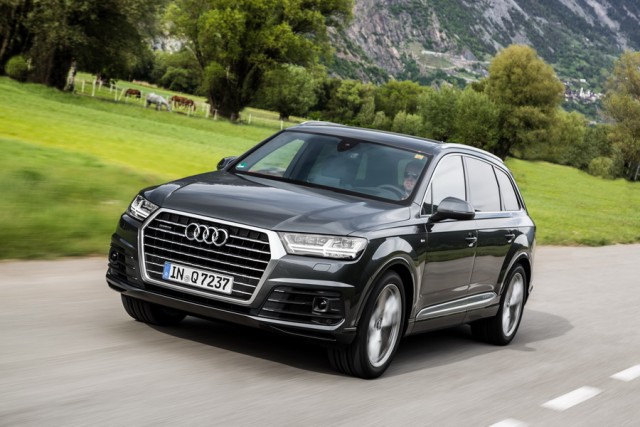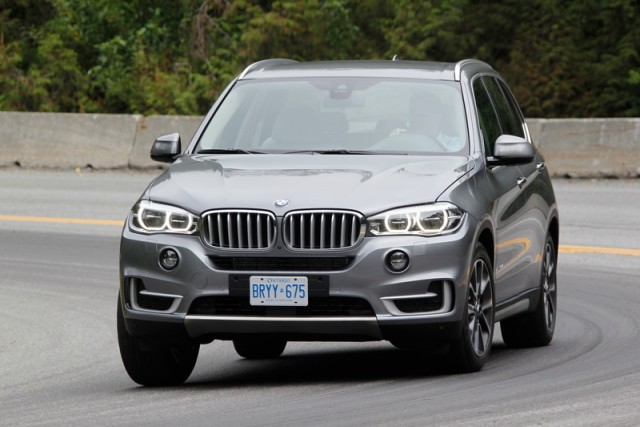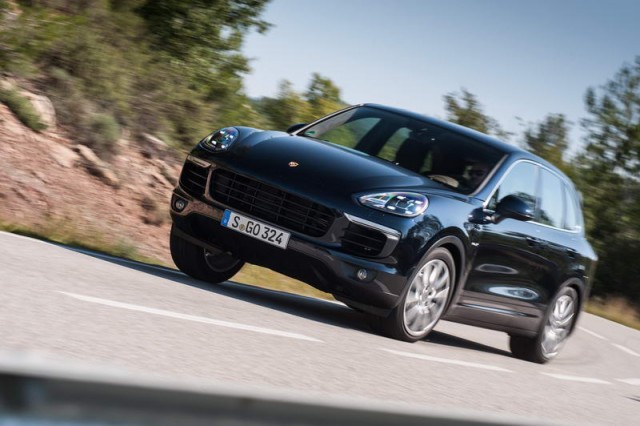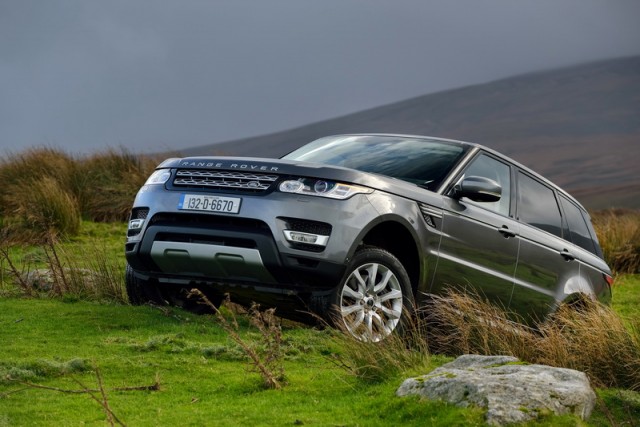When: May, 2015
Where: Verbier, Switzerland
What: Audi Q7 3.0 TDI 272hp S line
Occasion: International first drive review
Overall rating: 4/5
Audi has effectively created its new Q7 from a clean sheet, using lightweight know-how to shed some 325kg from the kerb weight. Add in a fast yet frugal engine and a lot of on-road refinement and you have an impressive package that flies under the radar of the style police. Here we review the 272hp TDI model.

Model Tested: Audi Q7 3.0 TDI 272 S line
Pricing: €85,875 as tested; starts from €72,975
Engine: 3.0-litre turbocharged V6 diesel
Transmission: eight-speed automatic, four-wheel drive
Body style: five-door, seven-seat SUV
CO2 emissions: 153g/km (Band C, €390 per annum)
Combined economy: 49.5mpg (5.7 litres/100km)
Top speed: 234km/h
0-100km/h: 6.5 seconds
Power: 272hp at 3,250- to 4,250rpm
Torque: 600Nm at 1,500- to 3,000rpm
Boot space: 770- to 1,955 litres (both figures with at least rear two seats folded)
EuroNCAP rating: not yet tested

In the metal 3.5/5
Aesthetically this second generation Audi Q7 is a big departure from the model it replaces. Audi has been keen to communicate just how much this new car has evolved, most noticeably with the 325kg weight reduction. The firm has achieved this through the widespread use of stronger and lightweight materials such as hot-formed steel and aluminium throughout the chassis and body. From a styling perspective it demonstrates a new chapter in Audi's design language, something that's already reflected in the face of the recently updated Q3.
Where the previous Q7 could be described as treading the line between muscular and flabby, this all-new model clearly shows its weight loss. Every panel looks taut, as if every sinew of its exterior shape has been thoroughly considered. This to a degree has also been to the large SUV's detriment, as by doing so it has lost a good deal of visual impact and presence. Parked next to a BMW X5 or Range Rover Sport, even the new Volvo XC90, it looks like a lesser model. This rings true whether viewed in its SE or S line guises, although the latter, with its standard 20-inch wheels, looks more impressive. A larger glazed area on all Q7s, and what appear to be lower door lines, creates a far less imposing image. Compared to its chief rivals it looks rather plain.

Inside, it's a more positive story with Audi once again showing it is capable of delivering a cabin design that not only looks impressive but also follows through with both materials and build quality befitting of a range-topping luxury SUV. The dashboard is a simpler affair than before and is set lower down, which helps to keep it more in your periphery vision and doesn't distract from the road. A larger touchpad capable of performing a number of different functions is located on the centre console just ahead of the low, flat gear selector for the eight-speed automatic transmission. It is a minimal affair in comparison to its rivals where button count can rise into three figures.
A high roof along with the aforementioned larger glazed areas boosts the impression of spaciousness. Passengers in the second row will find little to complain about in relation to comfort levels, while the third row (which will come standard on all Irish Q7s) features full-size seats - unlike the small pop-up versions employed by some other manufacturers.

Driving it 4.5/5
Whatever the new Audi Q7 may lack in terms of exterior provocativeness it more makes up for in on-road refinement and comfort. The cabin is exceptionally well insulated, helped further by the fitment of acoustic glazing in the front in all models. From the driver's seat, there is a commanding view of the road in front. Our test car was equipped with adaptive air suspension, which does a very thorough job of keeping the Q7 on an even keel through the bends, but we will reserve full judgement until we drive the Audi without the €3,121 option.
The electromechanical power steering requires only the lightest of touches to manoeuvre the Q7 through town masking the car's size and mass. However, more enthusiastic drivers will feel a sense of distance from the Audi's chassis. There just isn't the same mechanical feel that the likes of the BMW X5 or, to a slightly lesser degree, the Range Rover Sport, delivers.

With 600Nm of torque available from just 1,500rpm, the 3.0-litre diesel V6 engine gives the Audi tremendous levels of low down shove and requires only minimal throttle inputs to cruise along at a decent pace. Its eight-speed Tiptronic transmission switches between gears so smoothly on part-throttle that it is almost imperceptible. Choose to flick between gears yourself via the steering wheel-mounted paddles and the result is no different, though the gearbox software is so good and fast responding that leaving it to handle all the cog swapping does little to detract from the driving enjoyment. As with the road noise, the diesel engine is very well insulated from the cabin and even when pushed harder generates relatively minimal din. Audi's engineers have also kept the emissions level down in this more powerful engine, meaning it falls into the same Band C motor taxation as the less powerful 218hp version, the only exception to this being if you select the 21-inch wheels, which edge it over into Band D.

What you get for your money 3.5/5
It shouldn't seem overly surprising that there is a substantial options list available for the Audi Q7. To be fair though, the three trim grades offered do come reasonably well equipped. Few are likely to choose the entry level SE given that the SE Business spec, a €4,400 price walk from SE, comes with some tasty additions. These include colour co-ordinated bumpers, Valcona leather interior and sports seats. What makes it though is the inclusion of 19-inch wheels and the Virtual Cockpit - a 12.3-inch TFT screen that replaces the traditional instrument display and incorporates information like the satnav.
Buyers can also avail of two packages, which group together various options into a more competitively priced bundle. The first is a €4,501 Technology Package that includes the Audi Connect service linking the car to various online services and brings Google Street View to the satellite navigation. This also creates a Wi-Fi hotspot inside the car, which is sure to keep other passengers entertained on longer drives. Other features include a reversing camera, four-zone automatic air conditioning, keyless entry and a 558-watt Bose 3D Sound System comprising of 19 loudspeakers, centre speaker and a subwoofer.

The Tour Assistance Package carries a €2,876 price tag and includes a number of systems to make the urban commute that little bit less stressful. Adaptive Cruise Control ensures that a safe distance is always kept to the car in front even if the speed falls below the set level, while the Congestion Assistant and Active Lane Assist both work to keep the Q7 in line when driving in stop-start traffic, relieving the driver of the need to constantly accelerate and brake at slow speeds, effectively bringing semi-autonomous driving to reality. Other features include Traffic Sign Recognition, which cleverly displays the current speed limit should you have missed it, and a High-Beam Assist. This automatically and quickly dips your headlight's high beam when on-coming traffic is detected.
In addition to these packages, the list of optional extras is as extensive as it is, in certain cases, eye-wateringly expensive. For those who do greater distances there is the choice of specifying a larger 85-litre fuel tank (the standard size tank in the case of the TFSI petrol model) that also features a 24-litre AdBlue tank, twice the standard size, at a cost of €167. When brimmed, this extra 10-litre diesel capacity could extend the Q7's driving range by up to 1,440km.

Summary
The new Audi Q7 is set to divide opinion with its exterior styling. Fans of the first-generation may not be very impressed by the new, less imposing look. On the other hand, those who previously found the old Q7 a touch too big or vulgar for their liking will welcome the more conservative image of the new model. One aspect that both parties are likely to find agreement on is the interior and just how refined it is. And, with this segment being more about luxury than any amount of off-road ability, Audi has certainly engineered the Q7 well.












































